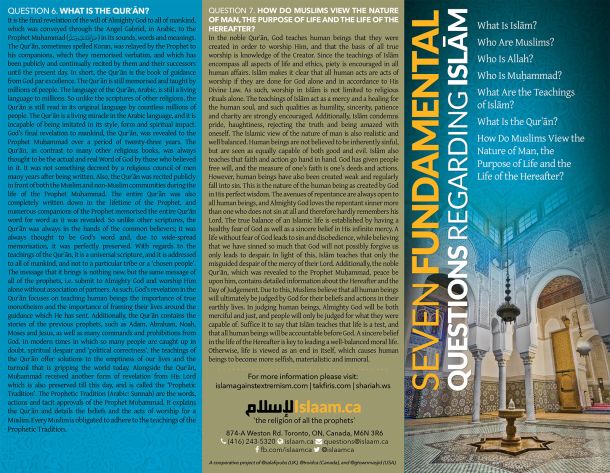News Archive
Jun 24, 2013
The Crime of Tamyīʿ upon the Salafī Manhaj
Reading from some of the Questions and Answers of Shaykh ʿʿUbayd al-Jābirī.
[Q1]: When you advise a person, do not sit with the various groups and parties (Ikhwān al-Muslimīn, Jama’aatut-Tableegh etc.) they say, “this is the manhaj of Shaykh Ibn Bāz (raḥimahullāh)”, that he would sit with every faction and group!
[Q2]: Some of the people claim saying, “we should encourage the students to seek knowledge but we shouldn’t speak about the issues of refutation, misguidance and deviation…when we encourage them to seek knowledge then they will be able to determine this (falsehood).”
[Q3]: Some pe…
Jun 20, 2013
https://www.troid.org/wp-content/uploads/2013/06/7questions.pdf
Seven Fundamental Questions Regarding Islām
What is Islām? Who are the Muslims? Who is Allāh? Who is Muḥammad? What are the Teachings of Islām? What is the Qurʾān? How Do Muslims View the Nature of Man, the Purpose of Life and the Hereafter?
Jun 20, 2013
The Consensus of the Scholars in Holding Fast to the Sunnah and Its People
From the points discussed:
Holding fast to the Qurʾān and Sunnah and ardently adhering to it is the mightiest of the foundations and founding pillars of Islām.
The one who abandons this has given rise to his own destruction.
It is Tawḥīd and adherence to the Sunnah that makes us brothers, this is what unites our hearts.
This blessed manhaj consolidated our hearts.
We are not like the Ḥizbiyyīn who love and hate for the sake of allegiance and bias.
There are many paths of deviation, many Shayṭān, only one path of Qurʾān and Sunnah.
All of Ahl al-Bidʿah, claim to be upon the…
Jun 20, 2013
I Am New to Salafiyyah, What Should I Do Now?
Seek religious knowledge from its primary sources, and cooperate with your Salafī brothers upon righteousness and piety in spreading this Daʿwah
Shaykh Rabīʿ ibn Hādī al-MadkhalīThe questioner says,
“Indeed, I love you for the sake of Allāh. O Shaykh, I am new to Salafīyah, which is the truth, and I do not know what I should do now. So provide me with some direction – may Allāh bless you.”
The Shaykh (may Allāh preserve him) responded:
“Establish the prayer, give Zakāh and make your religion purely and sincerely for the sake of Allāh, the Lord of the whole of the creation.
Seek religious…
Jun 18, 2013
Identifying the Middle Path Amidst the Multiplicity of Muslim Groups and Movements
In contemporary times, where the realities of the paths to misguidance are hidden behind Islamic names, titles, institutions, organisations and societies – our brother, Abū Iyāḍ Amjad Rafīq unmasks the methodology of Iblīs in attempting to invite and entice the believers to the many paths of misguidance whilst misguiding them from the path of guidance.
Amongst the points discussed:
Recognising the call of Iblīs and the signs of his enmity.
Is Iblīs inviting to sin? Or is he inviting to deviation from the path of Allāh? Which of the two is more beloved to him?
A brief look…
Jun 18, 2013
Walāʾ (Allegiance) and Barāʾ (Disallegiance) for the Uṣūl
From the points discussed:
الحب و البغض Love and Hate for the sake of Allāh is from the most important of the affairs of the religion
الولاء والبرااء Allegiance and Disallegiance is from the greatest handholds of Islām
A person should love another for the sake of Allāh
The traits towards tasting the sweetness of īmān
A person may not taste this sweetness until he implements الولاء والبرااء Allegiance and Disallegiance
What is the definition of الولاء والبرااء Allegiance and Disallegiance?
Inappropriate definition of Allegiance and Disallegiance can lead to extremism and t…
Jun 17, 2013
The Evils and Harms of Drugs
وَلَقَدْ كَرَّمْنَا بَنِي آدَمَ وَحَمَلْنَاهُمْ فِي الْبَرِّ وَالْبَحْرِ وَرَزَقْنَاهُم مِّنَ الطَّيِّبَاتِ وَفَضَّلْنَاهُمْ عَلَى كَثِيرٍ مِّمَّنْ خَلَقْنَا تَفْضِيلاً
And indeed We have honoured the Children of Ādam, and We have carried them on land and sea, and have provided them with al-ṭayyibāt (lawful good things), and have preferred them above many of those whom We have created with a marked preference.
[Sūrah al-Isrāʾ, 17:70]
From the points discussed:
Allāh forbade Mankind from utilising anything that will impair the intellect
Allāh has prescribed punishments for those…
Jun 14, 2013
Blood on the Streets of Woolwich: Demystifying the False Claims of the Terrorists
From the points discussed:
What was the purpose of Allāh sending the Prophets and Messengers?
The Woolwich Murderer: A call to blood, murder and oppression – not the call of the Prophets and Messengers
They (Khawārij) claim: “This is the Law of Allāh.” Rather, it is the law of their (evil) desires!
Whose right is it to establish law and punishment? Every person himself or the Ruler and Government?
The false claim: this is vengeance/revenge/retribution (random killings, terrorism, bomibngs etc.)
The interpolation of verses of the Qurʾān addressing the Muslim rulers, instead appl…
Jun 13, 2013
Advice to the Salafī Sisters of Toronto
Some of the discussion points –
Follow up an evil deed with a good deed
Seek Allāh’s forgiveness for your mistakes
When you fall short, when you sin…don’t despair, don’t turn away O Sister!
Be moral, be upright!
Have your guardian seek an individual (for you) who is truthful, honest, upright upon Salafīyyah and able to provide for you
Ask the suitor: which masjid, which centre…who do you associate with (Arqam, Abū Huayrah)? Who are your men (associates)?
What will he (potential husband) teach your children? Uṣūl al-Sittah of Muḥammad Ibn ʿAbd al-Wahhāb or the Uṣūl of Jamaa’atut-Tablee…








